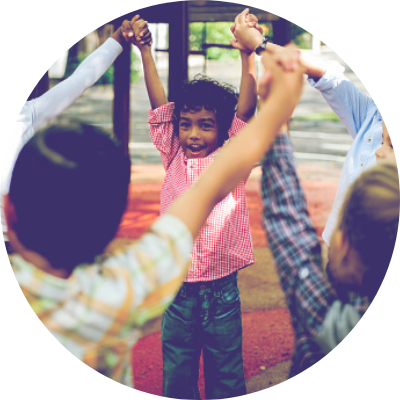
Universal Pre-Kindergarten
Policy Successes
Find out how Florida addressed the Pre-K shortage and became one of the leading states for pre-K access.
Discover how Oklahoma’s initiative is contributing to school readiness and academic success, and improving community-level protective factors to prevent child abuse and neglect.
Universal preschool or pre-kindergarten (hereafter, universal pre-K) programs offer partial- or full-day educational programming to every preschool-age child—generally around 3 or 4 years old—in a city, region, or state, regardless of family income, children’s abilities, or other factors. Early childhood education interventions like pre-K are associated with increased kindergarten readiness as well as improved long-term academic performance.
The benefits of these programs and policies may also have implications beyond educational benefits. Universal pre-K fits into the growing conversation around the social determinants of health: improving outcomes for children and families by focusing on the places in which they live, work, learn, and play. Studies find that pre-K with parental support and engagement is associated with a higher rate of high school completion, more years of completed education, and higher rates of attendance in four-year colleges. These studies also show that children enrolled in preschools with parental engagement experience direct health benefits, as well, which extend into adulthood. Children enrolled in preschool with parental engagement for 1 or 2 years were more likely to have health insurance coverage and lower rates of depressive symptoms. These children had a 52% reduction in substantiated reports of child abuse and neglect. They also have lower rates of juvenile arrests, violent arrests, felony arrests, convictions, and incarceration.
Universal pre-K can contribute to reducing or mitigating risk factors such as parental stress, social isolation, and community poverty. Having a high-quality, safe place where children spend part of the day allows many parents to find and maintain jobs. Families with lower incomes might otherwise be forced to compromise on the quality and consistency of care for their children, which can increase the risk of exposure to adverse childhood experiences.
These programs, when paired with parenting support and engagement, can also help promote protective factors including increasing parental incomes, providing quality education, enhancing positive parenting skills, and creating access to supportive social networks.
Policy Successes
Find out how Florida addressed the Pre-K shortage and became one of the leading states for pre-K access.
Discover how Oklahoma’s initiative is contributing to school readiness and academic success, and improving community-level protective factors to prevent child abuse and neglect.
Implementation Strategies
With careful implementation, policies and programs that improve the accessibility and quality of universal pre-K may provide far-reaching benefits to children, their families, and their communities.
Three states—Florida, Georgia, and Oklahoma—have implemented universal pre-K to ensure equitable access to quality early childhood education for every eligible child. People working in the field are honing strategies to improve their effectiveness and sustainability. Here we highlight key implementation strategies, including: Access, Quality, Evaluation and Improvement, and Partnerships.

Access
The myriad benefits stemming from early childhood education speak to the importance of ensuring equitable, universal access to pre-K programs for every child. Even with increasing rates of enrollment, less than half of 4-year-olds nationwide are enrolled in preschool or a related program such as Head Start or special education. Universal pre-K programs can improve access for children from diverse incomes and backgrounds, benefiting both middle- and low-income children. Universal pre-K programs that can offer a full day of free or low-cost programming provide expanded options for working families while contributing to improved academic and social-emotional skills for participating children.

Quality
Pre-K programs have invested in strategies that improve program quality, including hiring qualified teachers, reducing class sizes, and incorporating social-emotional learning. In fact, programs that focus only on cognitive skills lack positive effects on children’s behavioral outcomes. Many states, including North Carolina, Oklahoma, and Rhode Island, require preschool teachers to have a bachelor’s degree. In Oklahoma, preschool teachers are paid on a scale equivalent to that of K–12 teachers to help draw a more qualified applicant pool.
Researchers find that including social-emotional learning in pre-K programs improves the effectiveness of preschool because it helps ensure young children who are new to the school environment are better able to adjust and thrive. Social-emotional learning refers to skills beyond traditional education that are integrated into classroom instruction to benefit school readiness and child well-being. In an analysis conducted by Penn State University and funded by the Robert Wood Johnson Foundation, researchers found that social-emotional learning in preschool can positively impact learning behaviors and kindergarten readiness, while reducing problem behaviors such as aggression.

Evaluation and Improvement
Research and evaluation can help measure and improve the effectiveness of pre-K programs. Studies of pre-K programs across the country provide program administrators, early education practitioners, and public officials the opportunity to learn the lessons from earlier iterations. Incorporating evaluation metrics from the start of program administration can help ensure the practice of research and evaluation is carried out through a program’s life cycle.
As noted in a 2017 task force report supported by Brookings Institution and Duke University’s Center for Child and Family Policy, the “rigorous evaluation of impact” of pre-K programs is critical and the task force found there is already “uniformly positive evidence of impact on kindergarten readiness” stemming from the implementation of these programs.

Partnerships
Pre-K programs across the country have established partnerships with public and private organizations to expand the pool of service providers that can offer pre-K instruction. Having a variety of providers that serve every community across a particular state or region is crucial to ensuring programming is universal and reaches all preschool-age children. Strong organizational partnerships can also provide opportunities to supplement the benefits of classroom instruction with access to other needed services, such as, dental, health, and social services.
The Centers for Disease Control and Prevention recognizes ChangeLab Solutions for their assistance in developing the Policy in Action for Preventing Child Abuse and Neglect content.

